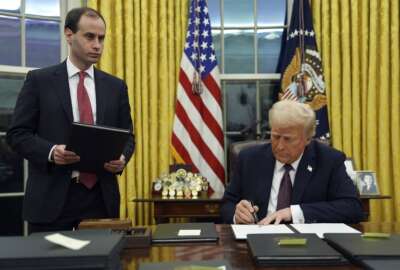
How one National Guardsmen helps troops process death in the coronavirus crisis
One of the more somber and unpleasant jobs performed by the National Guard is to properly handle the bodies of people who died from COVID-19.
As the National Guard continued to aid New York City at the height of the coronavirus outbreak, the disease wreaked havoc on the medical infrastructure.
One of the more somber and unpleasant jobs performed by the National Guard during that time was to properly handle the bodies of people who died from COVID-19. The New York medical examiner’s office was overwhelmed by the number fatalities and deployed more than 40 mobile morgues.
New York Army National Guard Sgt. Giuseppe Vignolesi was on the frontlines of the crisis in the city, but his job was a little different than others’. Vignolesi, a religious affairs non-commissioned officer, spent his time helping those already lending a helping hand.
As members of the National Guard streamed in finishing long days fighting the virus, Vignolesi fought something different – fear, loneliness, trauma and hopelessness.
Vignolesi’s job is to provide support to the Guardsmen directly after working in the field. He was placed with the Guardsmen working with the medical examiner’s office, safely removing infected bodies from homes and storing them for funeral arrangements.
It’s a job that can be morbid, and forces Guardsmen to brush up against some of the harder parts of humanity. It’s also one that comes with many emotions.
“Dealing with this type of trauma to this magnitude, it’s a very human response to react to it,” Vignolesi told Federal News Network. “That’s where we come in and we try to listen and adjust to that narrative. This is really powerful stuff.”
Vignolesi coached, advised and listened to Guardsmen as they felt frustration, fatigue and homesickness while moving their fellow humans en route to their final resting place.
“We come in and we really try to fortify the importance of the mission,” Vignolesi said. “They are pounding the ground, so to speak and pouring their hearts out into this. These guys are heroes to me when I see them go in there to move bodies.”
Vignolesi said for many Guardsmen the job can be a lot to process, especially considering they are weekend service members. Many of them have other lives as software engineers or janitors – far away from the death they were now seeing every day.
To ensure the stability of the troops, Vignolesi checked with leaders on the ground to see who might need a check in.
It could be something as simple as a tap on the shoulder and asking if things were OK.
“There’s only so much we can do in the chaplaincy that we can do for these troops,” Vignolesi said. “It’s really these troops leaning to their left and right, looking to their left and right and checking on each other. We’ve really tried to put that out there and they’ve done it consistently.”
Vignolesi said what he tries to do is instill a communal atmosphere that makes troops feel like they can reach out and talk to each other.
The only people who can fully understand what the Guardsmen are seeing every day in this situation are the ones standing shoulder to shoulder with them. That’s why Vignolesi said it’s important that they take the time to process those emotions and check in with each other so they know there is a willing ear not far away.
Share your appreciation for dedicated public servants and all that they do during Federal News Network’s second annual May We Say Thank You campaign.
Copyright © 2025 Federal News Network. All rights reserved. This website is not intended for users located within the European Economic Area.
Scott Maucione is a defense reporter for Federal News Network and reports on human capital, workforce and the Defense Department at-large.
Follow @smaucioneWFED
Related Stories





